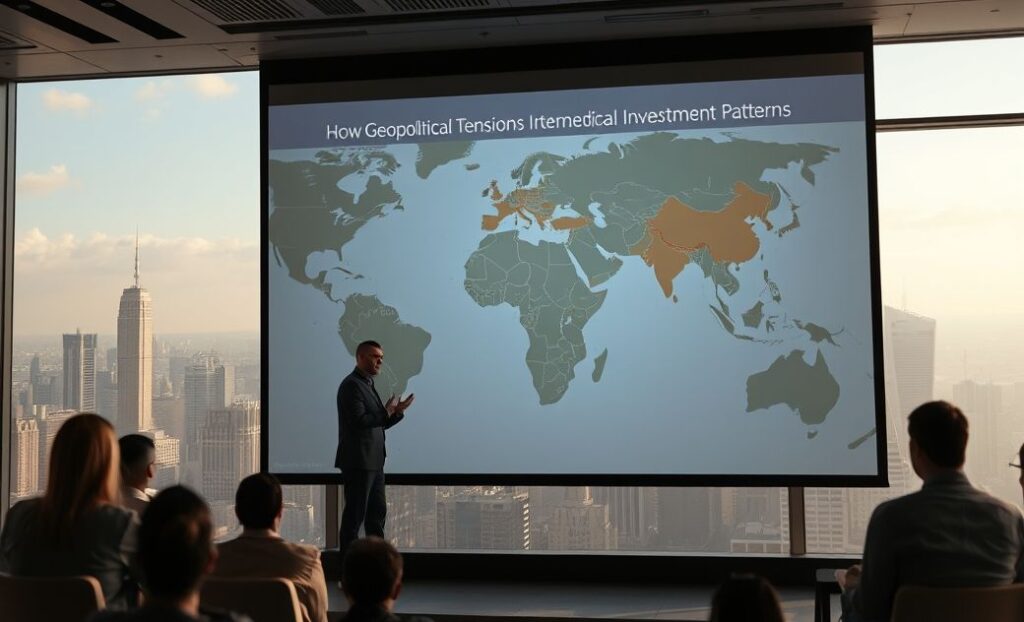Geopolitical tensions have long played a significant role in shaping global investment patterns. Investors, in their pursuit of optimal returns, must navigate a complex landscape influenced by international politics. Understanding how these tensions impact investment strategies is crucial for anyone participating in the global market.
Understanding Geopolitical Tensions
Geopolitical tensions refer to the friction between countries due to differing political agendas, trade policies, military conflicts, or diplomatic disputes. These tensions can lead to economic sanctions, trade barriers, and even military confrontations, all of which influence global markets and investment strategies.
The Ripple Effect on Markets
When tensions arise, markets often react swiftly, leading to increased volatility. Investors generally seek safety, moving assets away from riskier investments and into safer ones, such as bonds or gold. This shift can significantly impact stock prices, currency values, and commodity prices, creating both challenges and opportunities for keen investors.
Heightened Risk and Uncertainty
Geopolitical instability typically increases market uncertainty. Investors, unsure about the future, might delay or alter investment plans. This can result in reduced investment flows into affected regions, slowed economic growth, and even capital flight, as investors seek more stable environments for their assets.
Sector-Specific Impacts
Geopolitical tensions do not affect all sectors equally. Some are more sensitive to international relations, while others may remain relatively insulated. Understanding these dynamics is essential for strategic investment planning.
Energy and Commodities
The energy sector, particularly oil and gas, is highly susceptible to geopolitical tensions. Conflicts in major oil-producing regions can lead to supply disruptions and spikes in prices. Investors often watch geopolitical developments closely to anticipate changes in energy prices, which can impact broader economic conditions.
Technology and Manufacturing
Tensions surrounding technology, particularly those involving cyber threats and intellectual property rights, can influence investment in this sector. Trade disputes can also disrupt global supply chains, affecting manufacturing industries. Investors must consider these risks when investing in tech and manufacturing stocks.
Strategies for Investors
Investors must adapt their strategies to navigate the uncertainties brought about by geopolitical tensions effectively. Employing a diversified approach and staying informed about global developments are essential components of a successful investment strategy.
Diversification
Diversification remains one of the most effective strategies for mitigating risk associated with geopolitical tensions. By spreading investments across different asset classes, sectors, and geographic regions, investors can reduce their exposure to any single source of geopolitical risk.
Staying Informed
Keeping abreast of global news and political developments can give investors a competitive edge. Understanding the potential implications of geopolitical events can guide decision-making and help investors anticipate market shifts.
The Role of Policy and Diplomacy
Government policies and diplomatic efforts play a crucial role in shaping the impact of geopolitical tensions on investment patterns. International cooperation and conflict resolution can ease tensions and stabilize markets, whereas aggressive policies can exacerbate issues.
Economic Sanctions
Economic sanctions are a common tool used by governments to exert pressure without resorting to military action. While effective, they can also disrupt global trade and investment, highlighting the delicate balance policymakers must maintain.
Diplomatic Initiatives
Diplomatic initiatives, such as treaties and alliances, can diffuse geopolitical tensions and foster a conducive environment for investment. Investors closely monitor such developments to gauge their potential impact on global markets.
In conclusion, geopolitical tensions are a significant factor influencing global investment patterns. Understanding their impact, sector-specific vulnerabilities, and strategic responses can help investors navigate the complex global landscape. With informed decision-making and strategic diversification, investors can better weather the uncertainties associated with geopolitical dynamics.
